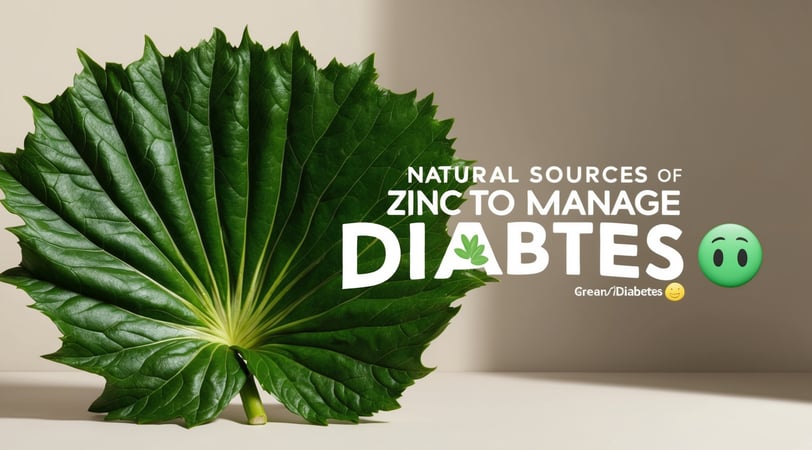Natural Sources of Zinc to Manage Diabetes 🌿
Natural Sources of Zinc to Manage Diabetes 🌿
Sophia Gold
8/8/20244 min read


Introduction: The Role of Zinc in Diabetes Management
Zinc is an essential mineral that plays a crucial role in numerous bodily functions, including immune system support, wound healing, and insulin production. For individuals managing diabetes, maintaining adequate zinc levels is particularly important, as this mineral is involved in the regulation of insulin and blood sugar levels. As someone who understands the complexities of living with diabetes, I know how vital it is to incorporate natural sources of zinc into your diet to support overall health. In this article, I’ll explore the best natural sources of zinc and how they can help you manage diabetes more effectively.
Why Zinc? The Benefits for Diabetes
Zinc is vital for many aspects of health, especially for individuals with diabetes. A deficiency in zinc can impair insulin function and worsen blood sugar control. Here’s why zinc should be included in your diabetes management plan:
Key Benefits of Zinc:
Supports Insulin Production: Zinc is involved in the synthesis, storage, and release of insulin, making it essential for proper blood sugar regulation.
Enhances Immune Function: Adequate zinc levels help strengthen the immune system, reducing the risk of infections and inflammation-related complications.
Promotes Wound Healing: Zinc is crucial for wound healing, which can be a concern for individuals with diabetes due to slower healing times.
Regulates Blood Sugar Levels: Zinc plays a role in glucose metabolism, helping to maintain stable blood sugar levels and reduce the risk of spikes and crashes.
Natural Sources of Zinc for Diabetes
1. Shellfish
What They Are:
Shellfish, particularly oysters, crab, and shrimp, are some of the richest natural sources of zinc. These seafood options are also low in calories and high in protein, making them a nutritious choice for people with diabetes.
Benefit:
Regular consumption of shellfish can help maintain adequate zinc levels, support insulin production, and enhance overall health.
How to Use:
Include shellfish in your diet by steaming, grilling, or adding them to salads and soups. Oysters, in particular, are extremely high in zinc.
2. Meat and Poultry
What They Are:
Red meat (such as beef and lamb) and poultry (like chicken and turkey) are excellent sources of zinc. They also provide high-quality protein, which helps maintain muscle mass and support overall health.
Benefit:
Consuming meat and poultry can help increase your zinc intake, support insulin function, and provide other essential nutrients like iron and B vitamins.
How to Use:
Incorporate lean cuts of meat and poultry into your meals by grilling, roasting, or adding them to stews and casseroles.
3. Nuts and Seeds
What They Are:
Nuts and seeds, such as pumpkin seeds, cashews, and almonds, are good plant-based sources of zinc. They also provide healthy fats, fiber, and other essential nutrients.
Benefit:
Including nuts and seeds in your diet can help boost your zinc levels, support heart health, and aid in blood sugar control.
How to Use:
Snack on a handful of nuts, add seeds to salads or yogurt, or incorporate them into homemade energy bars or smoothies.
4. Legumes
What They Are:
Legumes, including chickpeas, lentils, black beans, and kidney beans, are rich in zinc and provide fiber, protein, and other essential nutrients.
Benefit:
Legumes offer a plant-based source of zinc and support stable blood sugar levels due to their low glycemic index.
How to Use:
Add legumes to soups, stews, salads, or use them as a base for dips like hummus. They can also be a hearty addition to main dishes.
5. Dairy Products
What They Are:
Dairy products like milk, cheese, and yogurt are good sources of zinc, calcium, and protein. They also contain probiotics, which support gut health.
Benefit:
Including dairy products in your diet can help maintain healthy zinc levels and support bone health and digestion.
How to Use:
Enjoy dairy products as part of your daily meals by adding yogurt to smoothies, using cheese in salads or sandwiches, and drinking milk as a beverage or in cooking.
6. Whole Grains
What They Are:
Whole grains such as quinoa, brown rice, oats, and whole wheat are rich in zinc, fiber, and other essential nutrients. Unlike refined grains, whole grains retain their nutrient-rich bran and germ.
Benefit:
Consuming whole grains can help increase your zinc intake, improve digestion, and support overall health.
How to Use:
Replace refined grains with whole grains in your meals. Enjoy oatmeal for breakfast, quinoa in salads, or brown rice as a side dish.
The Science Behind Zinc and Diabetes: What Research Says
Research supports the role of zinc in improving insulin function and regulating blood sugar levels. A study published in the Journal of Nutrition found that higher zinc intake was associated with better glucose control and reduced risk of developing type 2 diabetes. Another study highlighted the importance of zinc in supporting immune function and reducing the risk of complications in individuals with diabetes.
Notable Statistics:
Improved Insulin Function: Adequate zinc intake has been linked to improved insulin production and sensitivity, reducing the risk of insulin resistance.
Reduced Risk of Diabetes: Higher zinc levels have been associated with a lower risk of developing type 2 diabetes, making zinc an essential nutrient for diabetes management.
Conclusion: Harness the Power of Natural Zinc Sources for Diabetes Management
Zinc is a crucial mineral that offers numerous benefits for individuals managing diabetes. By incorporating natural sources of zinc, such as shellfish, meat, poultry, nuts, seeds, legumes, dairy products, and whole grains, into your diet, you can support better blood sugar control, improve insulin function, and enhance overall health. These foods are not only rich in zinc but also provide a variety of other nutrients that contribute to a balanced and diabetes-friendly diet.
Resources for Further Reading:
Healthline: The Importance of Zinc for Health
National Institutes of Health (NIH): Zinc and Diabetes


